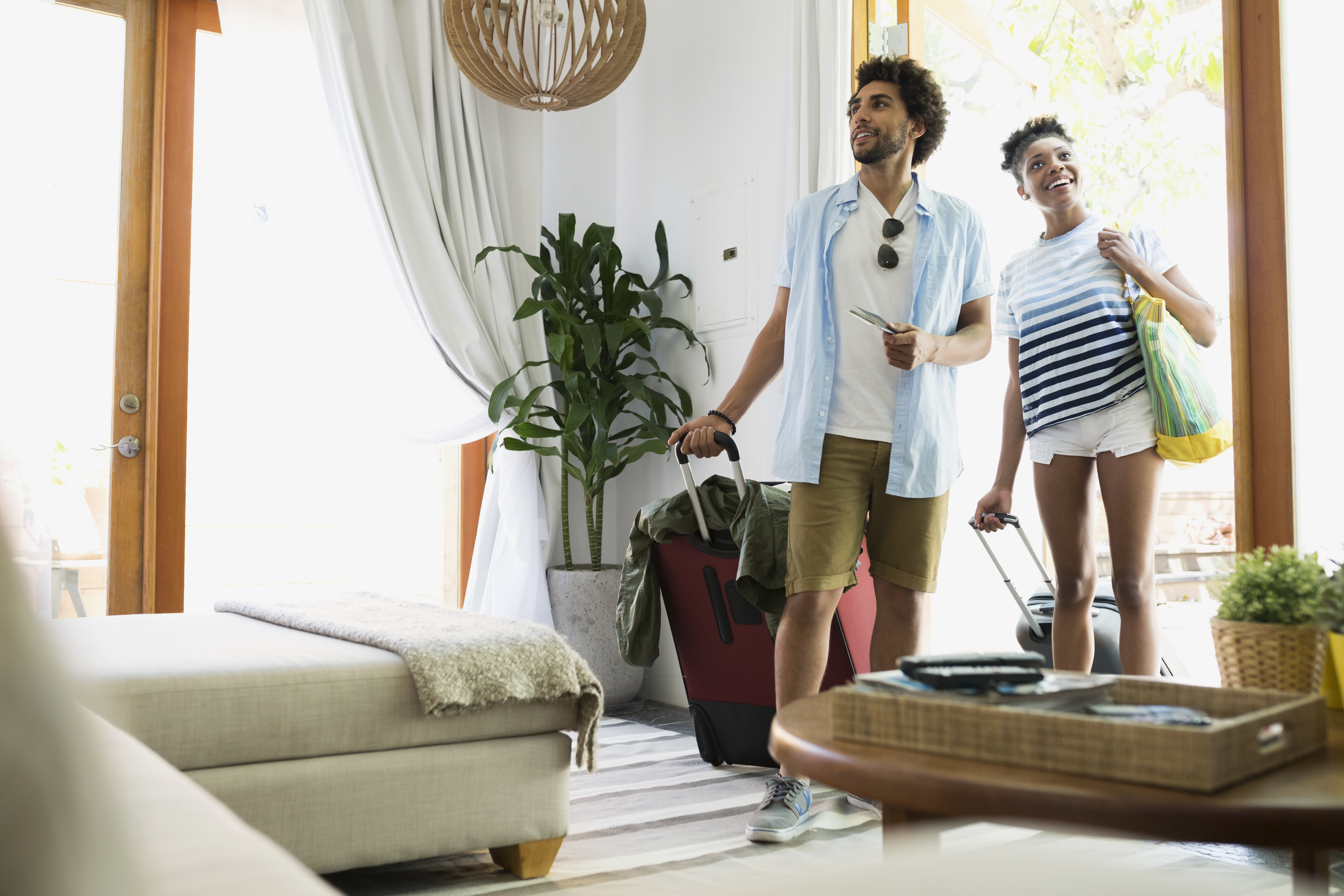How to become an Airbnb host
If you become an Airbnb host, you can make money from your home by listing a room – or all of it. Here’s how to get started


Owning a home costs money, but how about finding out how to become an Airbnb host and earning some money from it instead? Becoming an Airbnb host means you can boost your income by listing a spare room, or the whole place. It’s a flexible option, too. Signing up and getting started is simple. Use our step-by-step guide to become a host and watch your first visitors – and your extra income – arrive.
See all our favourite Airbnb destinations, or click through to Airbnb to find out how to become a host now.
Get started on Airbnb
1. First, you’ll need to sign up on Airbnb, giving details of the place you are listing, that is flat, house or other.
2. Next, indicate the property type – so, if you’re listing a house, you’ll select whether it’s a bungalow, cottage, or something more exotic like a shepherd’s hut.
3. You’ll also need to specify how much space you're letting, whether it’s the whole place you’re listing, or a room within it.
4. You’ll need to let Airbnb know how many guests you can accommodate, putting in the number of bedrooms, and the number of beds. The number of bathrooms needs to be given as well. WC and handbasin? That’s a half bathroom, while those with shower or bath count as one.
5. Guests only find out the address of your place once they’ve booked, but you do need to input it into the site. You’ll then be asked to check the pin locates your home correctly on the map.
6. List the amenities next. Airbnb offers tick boxes for towels and sheets, Wi-Fi, an iron and so on. You can add other items you provide to the listing later. Also, check off the safety amenities in accordance with the law in the country where your property is located. That’s things like smoke and carbon monoxide detectors.
7. If the property takes advantage of common areas like a pool, laundry or parking, you can indicate that these are available to guests as well.
How to take photos of your property for Airbnb
The next step of the listing is to upload your photos. Use these tips to get them right.
- Tidy up: make sure your place looks as clean and clutter-free as it will when guests arrive.
- Take landscape photos as this is how they’re displayed in the search.
- Use daylight: shoot your images during the day. Natural light is preferable, but turn on lights if you need to. Don’t use the flash.
- Maximise the light by drawing curtains away from windows and pulling up blinds.
- Take photos of all spaces that guests will use, including bathrooms as well as bedrooms, the kitchen and the living room.
- Include photos of the outside and the local neighbourhood, too.
- Take photos of anything characterful – a fireplace, artwork, etc. Bear in mind, though, that these should be additions, not substitutes for the rooms.
- Include images of any extras you provide, too. We’re talking things like complimentary groceries, or bathroom products.
- If your home is accessible to those with limited mobility, take photos of those features. That’s wide doorways, step-free entrances, grab rails and more.
- Ensure your pictures aren't blurry. Your photos should be 1024 x 683px at least.
- Consider the order of your photos once they’re uploaded. The first photo appears in search results and is the largest at the top of your listing. The next two photos are also really important as they’re prominent on the listing.
Write your listing on Airbnb
You’ll need to write up to 500 words about the property. This is an opportunity to say why your place is great to stay in (show your character!), what the area’s like and so on. You can also let potential bookers know what contact they’ll have with you.
Want to go into more detail about the property, how guests can contact you during their stay, the neighbourhood, and give information on getting around? There are extra sections for these, so you don’t need to shoehorn them into the 500 words.
Be specific in what you write. River view is better than fabulous view, for example.
Make your listing easy to read. Subheads that emphasise the important features will ensure it’s not a daunting block of words, plus allow potential bookers to scan the highlights. Writing a list? Bullet points are better than extended sentences.
You also have 50 characters to give your listing a title. Think about why people would book, and the special or unique features of your property, or the area.
If there are any potential downsides guests could bring up in a review – a long walk to the front door with suitcases in hand, for example – now’s the time to spell them out.
Get ready for reservations on Airbnb
Tip
If you think your home is suitable for families, check out the Airbnb help center for advice on making it infant and child-friendly.
The final step is to set up bookings and price. Airbnb has certain requirements guests must fulfil before they book, including providing an email address, phone number and payment information. They must also agree to your house rules, let you know the number of guests, get in touch about the trip, and confirm a check-in time if their arrival is within two days.
If you think these are sufficient, you can proceed to the next step. However, this is your chance to add the additional requirement that guests should submit ID issued by their government to Airbnb. You can also state that you want them to be recommended by other hosts and have no negative reviews. The site warns that these might mean fewer reservations, but you may want the peace of mind.
You’ll also need to set your house rules. These include:
- Child-friendly? It's important to stipulate whether the house is suitable for children and infants; it’s recommended that you say why the property might be dangerous or unsuitable for kids to guide potential guests;
- If smoking is allowed or not;
- Whether parties are permitted or not;
- Pets allowed? Although there’s a no pets option, be aware that this excludes assistance animals, for example guide dogs. You can only ask for one of these to be removed if it’s out of control – and guests don’t have to disclose the fact that they’re bringing one, even though they are encouraged to;
- Shoes on, shoes off? Now’s your chance to add in your own house rules, too;
- The lowdown: are there stairs to climb? Might it be noisy? Tick all that apply from the list.
Choose how guests can book on Airbnb
Once your listing is live guests can find it. If they agree to your rules and any other requirements you’ve set up, they could book instantly. Alternatively, you can opt to review requests.
If you’re only listing on Airbnb, allowing instant booking might be your preferred strategy. Airbnb says you’ll lose out on views of your listing and reservations if you don’t. However, if your property is also listed on sites such as HomeAway and Booking.com you’ll want to review booking requests so you don’t create calendar clashes between the sites.
Bear in mind that with instant booking you won’t have the opportunity to check out your potential visitors’ profiles either. You might prefer to see what previous hosts have said about them, and do a web search as well to see if it raises any red flags.
You’ll need to agree to keeping the calendar of availability up to date. Cancel a booking because you didn’t do this and you’ll be charged a fee.
This part of the sign up is where you’ll need to let Airbnb know whether you’re already a guest – or a newbie – and whether this is a part-time or full-time venture – or you’re not sure.
You’ll also have to decide how much notice you need before guests arrive. Same day arrivals will open you up to more bookings, but of course you’ll need to be able to get set that quickly. You can also decide on the check-in window you’re happy with. Happy to accommodate different times? You can say that you’re flexible.
Decide, too, how long in advance you’ll open bookings, or whether it’s just specific dates that are available. Want to use the property yourself, or aren’t around to welcome guests? You can block these dates.
Tell Airbnb what sort of stays you’re open to as well. Listings of one night could mean more bookings, but they’re more work for you.
Price your property on Airbnb
Airbnb and security deposits
Worried about the potential for damage? Airbnb lets you set a security deposit. The band is between $100 and $5,000 so you’ll need to check the current exchange rate to be sure what you’re opting for. If there is an issue, you would need to make a claim for damages to Airbnb for some or all of the deposit within 14 days of the guest’s checkout, or before a new guest checks in if this happens first.
When it comes to what you charge, the recommended option is smart pricing. This will adjust the listing cost for you as the demand changes – because of popular local events, the season, and whether bookings are for a weekend or weekday. You don’t have to use this feature, but the aim is to keep your property competitive.
You can input a base price – which is the default for days when you turn off smart pricing; a minimum price that’s the lowest nightly price you would settle for; and a maximum price for times when your area’s in demand. New to holiday letting? The site will suggest base, minimum and maximum prices, so you can begin with these and then change them later on if you need to.
The site also suggests adding a special offer when you’re new to help bring in your first guests. You need three reviews to get a star rating, so you could give the first three guests a percentage discount.
There’s also an option to discount some stays. You can offer a weekly discount that would cover a reservation of seven to 27 nights, or a monthly discount. This can help bring in visitors who search by price. Once again, Airbnb will make suggestions on what these percentage discounts could be to get you started.
If the guest agrees, you’ll get the money within five to seven working days. If not, you’ll need to involve Airbnb in dispute resolution, which will require documentation.
Once you’ve checked out the reminder about abiding by Airbnb’s discrimination policy and local laws, you can finish and preview your listing. When you’re happy with everything, you can change the status to listed within the Your listings section, and – within the hour – your place is set to appear in the search results.
Earning money with Airbnb
What you’ll make is the nightly rate minus the Airbnb service fee. The shared host and guest fee is the standard structure for individual hosts. The host service fee is 3 per cent (although it can be higher in some cases), and is automatically deducted from what you receive. The guest also pays a service fee to Airbnb.
You can choose how you’ll be earning – via PayPal or a wire transfer from the company. The payment is generally released to you around 24 hours after scheduled check-in, or monthly if the guest is staying 28 nights or more.
More holiday reading:
Get small space home decor ideas, celeb inspiration, DIY tips and more, straight to your inbox!

Sarah is a freelance journalist and editor writing for websites, national newspapers, and magazines. She’s spent most of her journalistic career specialising in homes – long enough to see fridges become smart, decorating fashions embrace both minimalism and maximalism, and interiors that blur the indoor/outdoor link become a must-have. She loves testing the latest home appliances, revealing the trends in furnishings and fittings for every room, and investigating the benefits, costs and practicalities of home improvement. It's no big surprise that she likes to put what she writes about into practice, and is a serial house revamper. For Realhomes.com, Sarah reviews coffee machines and vacuum cleaners, taking them through their paces at home to give us an honest, real life review and comparison of every model.